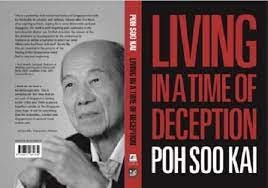Part 18: A first-hand account of life in detention in Singapore’s draconian ISA
A narrative about injustice: “A Cause Greater than Ourselves.” ISD's excuse for abuse of power
A continuation of Zulfikar’s account of life under Singapore’s ISA
Shireen visited me a few days later. Charlton, Chang and Tim had told me repeatedly to tell Shireen to return to Australia. They did not want her in Singapore. They knew that with Shireen in Singapore, she would fight for my release and be able to meet with lawyers and arrange support.
In Australia, it would be much more difficult for her to organise my release. She would be totally dependent on the ISD to supply her with information.
I did not take it seriously at first. Shireen and I needed to discuss it. It was not for them to tell us what to do. And it was not for us to protect their abuse of power.
But after Chang’s threat, I could not take the risk. During her visit, I told Shireen to return to Australia.'
She was shocked. “No, I will stay. I will fight for you.”
“No sayang. Go home. Don’t stay.” I could not tell her why.
“Abang no. If this happened to me or the kids you would stay and fight. I want to stay.”
I insisted that she leave. Shireen was distraught. She did not understand why I changed so much, so suddenly. I was passive and compliant. I acted as though everything was going well. I pretended that it was necessary that I was detained. I even told her that they needed to detain me. I had to pay for it.
I could not tell her that the ISD had threatened to arrest our children and her. After my release, I read Dr Poh Soo Kai’s account of his own 16 years ISA detention. The ISD detained his wife for months to put pressure on him.
A few weeks later, I asked Chang if his threat to arrest my wife and children were just police tactics to get me to do what they wanted.
“No, I would have arrested them” he said, as though that was the most natural thing.
In one of our discussions, Tim explained Chang’s targeting of families was because “he is an old timer.” But Tim did not explain his own threats on my family.
According to Tim, he joined the ISD in the late 1990s. He admitted that the ISA has been used politically “but that was more than 20 years ago”, meaning the supposed “Marxist conspiracy” arrests were politically motivated. But it was before his time.
Amazingly, DSP Iqbal Abdul Rahim who would be my rehabilitation officer (RTO) and said he joined the ISD in the 1980s also admitted that the ISA has been used against political opponents. But for him, that was in the 1960s. Both admitted that the PAP government had used the ISA for political gain, but it was before their time.
Quite a convenient way to ease their guilt.
In my conversations with ISD officers, I realised that they were driven by their cause.
They believed that protecting the PAP was the same as protecting the government which equated to protecting Singapore. To criticise the PAP was to criticise Singapore. They tolerated people who made minor criticisms or discussed policies. But I criticised the system and the PAP’s legitimacy.
And I criticised the PAP’s control of the Muslim community. That was a threat.
A common phrase, which some officers use for their badge lanyard was “A Cause Greater than Ourselves.” I told them “You can sacrifice yourself for your cause. You don’t have the right to sacrifice others.”
The problem, however, is that their cause demanded the sacrifice of others. And they believed in it with absolute conviction.
When she was back in Melbourne, I sent a message to Shireen through my mother. I requested that she speak with Renuka Subramaniam, my Malaysian lawyer friend at La Trobe University to get her advice. Renuka was a human rights lawyer.
After my meeting with my mother, Tim asked me about my message to Shireen (this happened regularly. They listened, took notes and would interrogate me about what I said to my family).
Tim pointed out that Malaysia had repealed the ISA and replaced it with another law.
“Yes” I replied. “Because the Malaysians lobbied for it and that was how it changed.”
He looked alarmed. “That sounds like a veiled threat.”
At that time, I did not understand why they would think campaigning to change a law would be considered a threat. It was only after the second year that I realised that their intention was to make me quiet, docile, and apolitical. I was not supposed to think about campaigning for change.
What was worse, was that I discussed abolishing the ISA, the law that granted them absolute power.
Subscribe Below:





